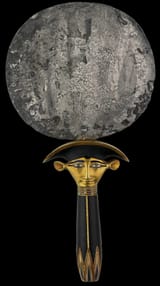Search Results
!!P38zFLDUYUh/x/40764229#40764688
7/20/2025, 11:21:01 PM
>>40764672
*whitespace, fix the typos yourself
>Symbolism
The fact that a mirrorreflects an image gives it a symbolic as well as a functional use. We are so used to endless, perfectly reflective surfaces that it is very hard to understand the importance and symbolism of mirrors to early cultures. Is your reflection merely a reflection of you or is it a separate you that you are observing? There is the possibility that part of your soul remained in the mirror after the image had disappeared. The face reflected is somehow detached from its body suggestive of a disembodied soul. The words “for your ka” were associated with the offering of mirrors. Was the phrase to be taken literally and the mirror seen as a depository of the soul?
The word ankhwas also a word for mirror. This may be because the reflective qualities of the mirror were a reaffirmation of light and so life. The fact that the mirror had the shape of an ankh would have been seen as evidence of the connection. One of the phrases used for mirrors is “a living one”. The mirror was seen as an active object, illuminating rather than merely reflecting as we would understand it now, and so was compared to the Eye of the Sun. They were labelled “one who sees like Re” and “one who sees the face”.
Hathor was a conduit into other worlds both after deathand at special times during this life. The mirrorwas a way of seeing into these other worlds. It is possible that the mirror was used for divining and as a portal into other worlds. Mirrorscan distort reality, an imperfect mirror will reflect a different reality back. With a mirror you can see what would otherwise be unseen. You can see yourself, you can use them to see behind you and around corners. Extending this logic you could also use them for divining, to see into the unknown and the future.
*whitespace, fix the typos yourself
>Symbolism
The fact that a mirrorreflects an image gives it a symbolic as well as a functional use. We are so used to endless, perfectly reflective surfaces that it is very hard to understand the importance and symbolism of mirrors to early cultures. Is your reflection merely a reflection of you or is it a separate you that you are observing? There is the possibility that part of your soul remained in the mirror after the image had disappeared. The face reflected is somehow detached from its body suggestive of a disembodied soul. The words “for your ka” were associated with the offering of mirrors. Was the phrase to be taken literally and the mirror seen as a depository of the soul?
The word ankhwas also a word for mirror. This may be because the reflective qualities of the mirror were a reaffirmation of light and so life. The fact that the mirror had the shape of an ankh would have been seen as evidence of the connection. One of the phrases used for mirrors is “a living one”. The mirror was seen as an active object, illuminating rather than merely reflecting as we would understand it now, and so was compared to the Eye of the Sun. They were labelled “one who sees like Re” and “one who sees the face”.
Hathor was a conduit into other worlds both after deathand at special times during this life. The mirrorwas a way of seeing into these other worlds. It is possible that the mirror was used for divining and as a portal into other worlds. Mirrorscan distort reality, an imperfect mirror will reflect a different reality back. With a mirror you can see what would otherwise be unseen. You can see yourself, you can use them to see behind you and around corners. Extending this logic you could also use them for divining, to see into the unknown and the future.
Page 1
